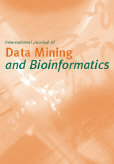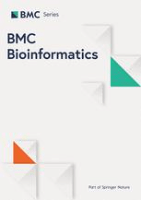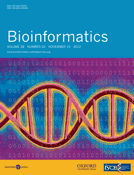
Bioinformatics Advances
metrics 2024
Innovative Insights for Computational Biology
Introduction
Bioinformatics Advances, published by Oxford University Press, is an esteemed academic journal that serves as a vital platform for the dissemination of innovative research in the rapidly evolving fields of bioinformatics and computational biology. With a promising E-ISSN of 2635-0041, this journal has made significant strides since its inception in 2021, achieving a commendable Q1 ranking in both the Computer Science Applications and Genetics categories, alongside respectable Q2 rankings in Molecular Biology and Structural Biology as of 2023. Though currently not an open-access publication, its critical insights cater to an audience keen on advancing knowledge and technology in genomic studies and data analytics. The journal emphasizes high-quality research and aims to facilitate the integration of computational techniques within biological sciences, making it an essential resource for researchers, professionals, and students alike who seek to stay at the forefront of bioinformatics advancements.
Metrics 2024
 -
- 2.40
2.40 -
- -
-Metrics History
Rank 2024
IF (Web Of Science)
JCI (Web Of Science)
Quartile History
Similar Journals

Database-The Journal of Biological Databases and Curation
Elevating Standards in Data Accessibility and UsabilityDatabase - The Journal of Biological Databases and Curation, published by Oxford University Press, stands at the forefront of the rapidly evolving fields of biological data management and curation. Since its inception in 2009, this open access journal has become a pivotal resource for researchers and professionals eager to explore the intricate world of biological databases. With an impressive impact factor, it ranks in the Q1 quartile across significant disciplines such as Agricultural and Biological Sciences, Biochemistry, Genetics and Molecular Biology, Information Systems, and Medicine as of 2023. This prestigious standing reflects its commitment to high-quality research and innovation. The journal not only provides a platform for original research articles, reviews, and case studies but also aims to facilitate discussion on best practices in database design and curation. By bridging the gap between data generation and utilization, it plays an essential role in enhancing the accessibility and usability of biological data, making it indispensable for scholars and students who are navigating these complex domains.

Quantitative Biology
Advancing Biological Insights Through Quantitative MethodsQuantitative Biology is a prestigious journal published by WILEY, focusing on the interdisciplinary study of quantitative approaches in the biological sciences. With an ISSN of 2095-4689 and an E-ISSN of 2095-4697, this journal has established itself as a critical platform for researchers exploring complex biological systems through mathematical and computational methodologies. Operating out of China, Quantitative Biology significantly contributes to its field, holding a Q2 ranking in various categories, including Applied Mathematics and Biochemistry, Genetics and Molecular Biology, according to the latest Scopus rankings. These rankings reflect the journal's commitment to publishing high-quality research that employs advanced modeling and simulation techniques. The journal's impact is evident with its position in the 84th percentile for Applied Mathematics, indicating its relevance and growth in a competitive academic landscape. Although it does not currently operate under an Open Access model, the journal is pivotal for professionals and students alike, aiming to bridge the gap between mathematical theories and biological applications. Researchers are encouraged to submit their innovative findings and engage with the vibrant community dedicated to advancing the quantitative understanding of biological phenomena.

International Journal of Data Mining and Bioinformatics
Exploring Innovations at the Intersection of Data and Biology.The International Journal of Data Mining and Bioinformatics, published by InderScience Enterprises Ltd, stands as a crucial platform for researchers and professionals dedicated to the intersection of data science and biological informatics. With its ISSN 1748-5673 and E-ISSN 1748-5681, this journal captures the essence of innovative research from 2006 to 2024. Though indexed in the Q4 category for Biochemistry, Genetics and Molecular Biology and Information Systems, it maintains a respectable Q3 status in Library and Information Sciences, reflecting its growing influence within the academic community. The journal also provides insightful contributions to the fields of big data analytics, machine learning, and computational biology. Although it is not currently an open-access journal, its relevance is underscored by its Scopus rankings, indicating a solid standing in the disciplines it encompasses. Researchers, students, and practitioners in data mining and bioinformatics are encouraged to explore the findings and methodologies presented, paving the way for future innovations in this dynamic field.

Molecular Systems Biology
Advancing the Frontiers of Biological ScienceMolecular Systems Biology, published by SpringerNature, is a premier open access journal that has been a cornerstone in advancing the fields of biological science since its inception in 2005. With its ISSN 1744-4292, this journal exemplifies high scholarly standards, boasting an impressive suite of impact factors, including Q1 rankings across various disciplines such as Agricultural and Biological Sciences, Biochemistry, Genetics and Molecular Biology, and more, highlighting its significant contribution to the scientific community. The journal offers robust access options to facilitate innovative research dissemination, reaching a global audience while maintaining a commitment to fostering collaboration and dialogue among researchers, professionals, and students. With a focus on integrating quantitative approaches to biological systems, Molecular Systems Biology plays a vital role in addressing complex biological questions, paving the way for groundbreaking discoveries and advancements in healthcare, environmental sustainability, and functional genomics.

Statistical Applications in Genetics and Molecular Biology
Connecting Theory and Application in Biological StatisticsStatistical Applications in Genetics and Molecular Biology, published by WALTER DE GRUYTER GMBH, serves as a vital academic platform for researchers and professionals dedicated to the integration of statistical methodologies within the fields of genetics and molecular biology. Established in Germany, this interdisciplinary journal, with an ISSN of 2194-6302 and E-ISSN 1544-6115, seeks to bridge the gap between statistical theory and biological applications, making it an essential reading for those engaged in data analysis, biological research, and computational methods. Despite its current Q4 ranking in key categories such as Computational Mathematics and Genetics, the journal continues to strive for academic rigor and relevance, addressing contemporary challenges and advancements in the field. The journal encourages the submission of high-quality, peer-reviewed research that showcases innovative statistical approaches to genetic and molecular data, providing valuable insights and fostering collaboration among scientists. Exploratory or applied studies that demonstrate effective statistical applications are particularly welcomed, ensuring that both novel and established methodologies are discussed, alongside practical case studies that advance the understanding of biological phenomena. As an open-access journal, it aims to widen the accessibility of cutting-edge research, emphasizing the importance of transparency and sharing knowledge among the scientific community.

JOURNAL OF COMPUTATIONAL BIOLOGY
Exploring the Synergy of Computational Methods and Biological ResearchJOURNAL OF COMPUTATIONAL BIOLOGY, published by Mary Ann Liebert, Inc., serves as a premier platform for the dissemination of groundbreaking research at the intersection of biological sciences and computational methods. Established in 1994, this journal provides a valuable resource for researchers, professionals, and students interested in the evolving fields of computational mathematics and biology. With a commendable Q2 ranking in several pertinent categories such as Computational Mathematics and Modeling and Simulation, it emphasizes high-quality studies that propel understanding and innovation in these areas. Although the journal currently operates under traditional access options, it plays a crucial role in fostering scholarly communication and collaboration among a diverse audience, advancing knowledge in genetics, molecular biology, and beyond. The journal's continual evolution, with a commitment to publish until at least 2024, positions it as a critical resource in the fast-paced world of computational biology.

BMC BIOINFORMATICS
Unleashing the Power of Data in Life Sciences.BMC Bioinformatics is a leading open-access journal published by BMC, dedicated to the rapidly evolving field of bioinformatics. With its inception in 2000, the journal has established itself as an essential resource for researchers, professionals, and students alike, disseminating high-quality research that bridges the gap between biology and computational science. BMC Bioinformatics holds a reputable Q1 ranking in Applied Mathematics and Computer Science Applications, and a Q2 ranking in both Biochemistry and Structural Biology, reflecting its significant impact in these interdisciplinary fields. The journal's broad scope encompasses innovative methodologies, tools, and applications that drive progress in biological research through computational approaches. With open access since its inception, the journal ensures unrestricted availability of cutting-edge research findings, promoting knowledge sharing and collaboration in the global scientific community. As it continues to publish advancements up to 2024, BMC Bioinformatics remains a cornerstone for those seeking to enhance their understanding of bioinformatics and its vital role in modern science.

Current Bioinformatics
Pioneering Research in Bioinformatics and BeyondCurrent Bioinformatics, an esteemed journal published by Bentham Science Publishers Ltd, serves as a pivotal platform for the dissemination of cutting-edge research in the fields of bioinformatics, biochemistry, computational mathematics, genetics, and molecular biology. With an ISSN of 1574-8936 and an E-ISSN of 2212-392X, this journal has established itself as a vital resource for researchers, professionals, and students keen on exploring interdisciplinary approaches to biological data analysis. Its prominence is reflected in its quartile rankings for 2023, where it stands in Q3 for biochemistry and computational mathematics, alongside Q4 rankings in genetics and molecular biology. Current Bioinformatics, located in the United Arab Emirates and converging from 2007 to 2024, aims to foster innovation in the field by presenting original research articles, reviews, and case studies that drive forward our understanding of complex biological systems through computational techniques. This journal is an integral resource for those wishing to stay at the forefront of bioinformatics research and applications.

BIOINFORMATICS
Transforming Biological Research Through Computational ExcellenceBIOINFORMATICS, published by Oxford University Press, is a leading journal in the realms of biochemistry, computational mathematics, and computer science, with a notable impact factor that underscores its significance in the field. Since its inception in 1985 and continuing through its expected convergence in 2024, the journal has maintained a prestigious reputation, proudly residing in the Q1 category across multiple disciplines, including molecular biology and statistics. With a Scopus ranking placing it within the top percentiles of its categories, BIOINFORMATICS serves as an essential platform for disseminating high-quality research that advances knowledge and innovation at the intersection of biology and computational sciences. This journal not only offers both subscription and open access options, ensuring wider availability of its cutting-edge research, but it has also become a crucial resource for researchers, professionals, and students aiming to stay at the forefront of bioinformatics and related fields. Explore the latest findings and trends that define the future of biological research through this esteemed publication, any inquiries regarding the journal can be directed to its offices located at Great Clarendon St, Oxford OX2 6DP, England.

FUNCTIONAL & INTEGRATIVE GENOMICS
Advancing the Frontiers of Genomic UnderstandingFUNCTIONAL & INTEGRATIVE GENOMICS, published by Springer Heidelberg, is a leading journal in the fields of genetics and molecular biology. Established in 2000, it serves as a pivotal platform for advancing our understanding of genomic functionality and integration, making significant contributions to both basic and applied research in genetics. With a robust impact factor and a ranking in the Q3 quartile for Genetics and Q2 for Medicine (Miscellaneous), the journal aims to publish innovative research that explores the relationships between genomic data and biological functions, appealing to a diverse audience of researchers and professionals. Although it operates under a subscription model, the journal's extensive archives remain a valuable resource for academics seeking to stay abreast of the latest findings and methodologies in genomics. As the field evolves, FUNCTIONAL & INTEGRATIVE GENOMICS remains committed to fostering scholarly dialogue and the dissemination of groundbreaking studies that influence future research trajectories.